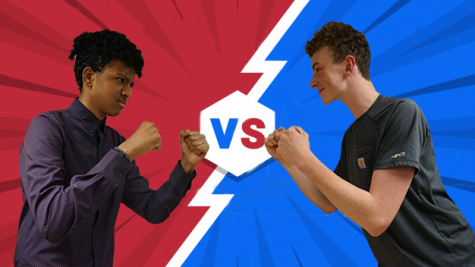Should Professional Athletes Be Idolized?
June 23, 2023

Yes, Professional Athletes Should Be Idolized
After recent controversies, such as the Ja Morant gun incidents and Deshaun Watson’s sexual harassment lawsuits, many have questioned, or even forgotten, the benefits of idolizing professional athletes. Although it may be true that these two individuals serve as poor role models for young fans, it is important to note that they represent a fraction of all professional athletes. Most serve as powerful symbols of inspiration, resilience and achievement, offering valuable life lessons and positively contributing to society through community service.
It is scientifically proven that the human brain has a negative bias, which is a natural tendency to give more weight to negativity than positivity. Sports media also releases more negative stories than positive ones, since they garner more attention. For these reasons, the great deeds of countless professional athletes often go unnoticed. Articles and headlines regarding Ja Morant waving a gun have dominated sports media, while Stephen Curry, who has been using his platform to promote voter registration and has donated six million dollars in funding to the collegiate golf teams at Howard University, isn’t talked about nearly enough.
In addition to being great members of their communities, professional athletes inspire and motivate many young athletes to be just like them. For example, Kylian Mbappe, considered by many to be the best soccer player in the world, was a massive fan of Cristiano Ronaldo in his youth. Mbappe spent many hours watching videos of Ronaldo on the internet, and childhood pictures of him in his room, filled with pictures of Ronaldo, have gone viral. Now a superstar, Mbappe emulates many of the signature moves that Ronaldo performs, and is even able to play games against his idol, smile and converse with him on the pitch. In March 2022, he admitted that he wishes “to imitate Cristiano Ronaldo’s career.”
Dylan Furlonge (II), a member of the Boston Bolts U17 team and long-time fan of the Brazilian soccer player Neymar, shares a similar sentiment with Mbappe. He explains, “whether it was [Neymar’s] hair, the cleats he wore or the skills he did, I tried to copy it.” Idolizing Neymar, a player known for his skillful dribbling and playmaking, has helped Dylan add moves to his own arsenal. Furlonge also shares, “Me and my cousins would sit around the TV and watch all the games, replaying the skills and goals we saw. Then we would go outside right after and try them. Ultimately, doing that everyday made us better.”
Looking up to professional athletes does not only benefit student athletes, but also non-athlete fans. Carltz Constant (II), an avid Lebron James fan, expresses, “Lebron’s story going from the trenches to one of the greatest basketball players ever is inspirational and motivates me. It is like the hero’s journey, and how he goes through many obstacles but comes out successful […] helps me to continue being determined and go through different challenges.” As Constant claims, the benefits of idolizing professional athletes extend beyond the athletes themselves. People can take their success stories and translate them into their own lives, whether it has anything to do with a certain sport.
No, Professional Athletes Should Not Be Idolized
In recent years, professional sports have grown to be much more than a source of entertainment. Watching sports has become a worldwide phenomenon, where the highest level athletes are revered as heroes to millions of fans around the globe. We see athletes’ faces on magazine covers, billboards and cereal boxes, painting them as figures with untouchable athletic prowess. Amid the hero-like worship, however, it is essential to question the legitimacy of athlete idolization.
Recent controversies involving athletes, such as the suspension of Memphis Grizzlies point guard Ja Morant, a rising star in the National Basketball League (NBA), highlight the negative consequences that can arise from idolizing these individuals. On March 4, Morant was suspended for eight games without pay after a video of him holding a handgun while intoxicated in a nightclub in Denver, Colorado surfaced. Following the incident, Morant apologized through ESPN, “I know I’ve disappointed a lot of people who have supported me. This is a journey, and I recognize there is more work to do. My words may not mean much right now, but I take full accountability for my actions. I’m committed to continuing to work on myself.”
Even after all his promises, two months later, on May 13, Morant was once again seen flashing a handgun on Instagram while driving. The video circulated the internet, and has since been deleted. Morant faces an indefinite suspension and possible fines from the NBA.
After these events, many of his young fans were left disheartened and disillusioned. Morant’s situation proves that the idolization of athletes can blind us to their flaws and mistakes, leading to disappointment.
Idolizing athletes can have adverse effects on society. When a fan places an athlete on a pedestal, their actions can go unquestioned, giving them unjust power. Athletes can misuse their influence, and use their platforms to spread harmful ideas in instances involving criminal activities. The idolization of athletes blinds fans from the immorality of wrongful behavior, which runs the risk of normalizing and justifying such actions to impressionable young athletes. “[Morant] has an incredibly huge following,” expresses NBA commissioner Adam Silver, after Morant’s second suspension. “And my concern […] [is that] tens of millions of kids globally would see him as having done something that was celebrating in a way, the act of using a firearm in that fashion.”
Aspiring young athletes who are not born with outstanding athletic ability may also fall into the trap of worshiping a professional. The inability to perform at the level of their favorite athlete may lead to feelings of inadequacy and a negative self-image. Ben Davidson (III) shares his opinion on the dangers of hero worship in sports: “The easiest way to destroy young talent is to compare it to something else.”
Placing athletes on a pedestal is bound to lead to disappointed fans. Instead of idolizing athletes, we should appreciate their skills and accomplishments while recognizing their humanity, and focus on the positive qualities they embody. By doing so, we can foster a healthier and more balanced approach to sports and admiration.
